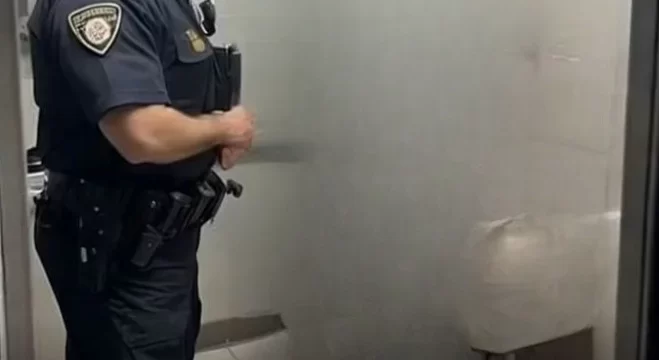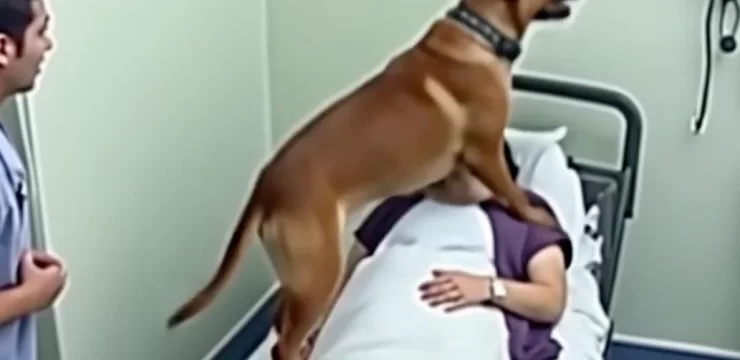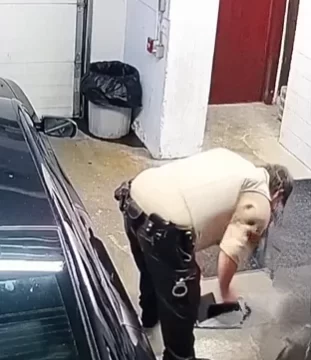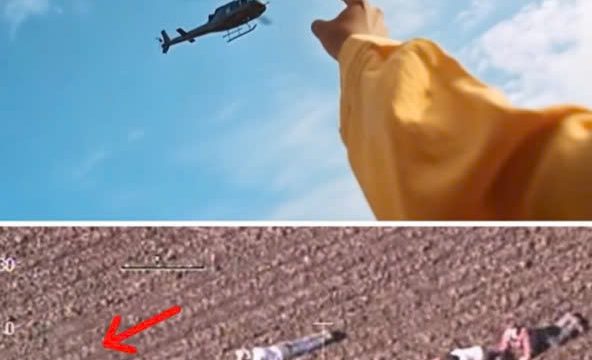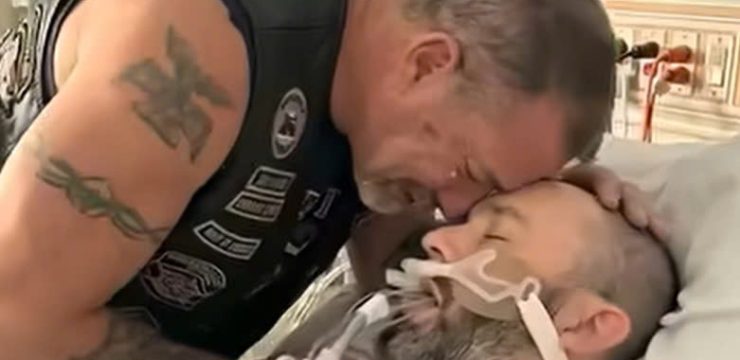The morning buzzed with the familiar noise of a busy high school, but there was something different about the atmosphere that day. The hallway outside room 10B throbbed with a strange, restless tension, the kind that made students glance around as if waiting for something to happen. The fluorescent lights cast a cold bluish tone across the tiles, and the low chorus of conversation blended together—locker doors slamming, footsteps echoing, hurried greetings—but beneath it all was an unusual stillness, like the school itself sensed a storm brewing.
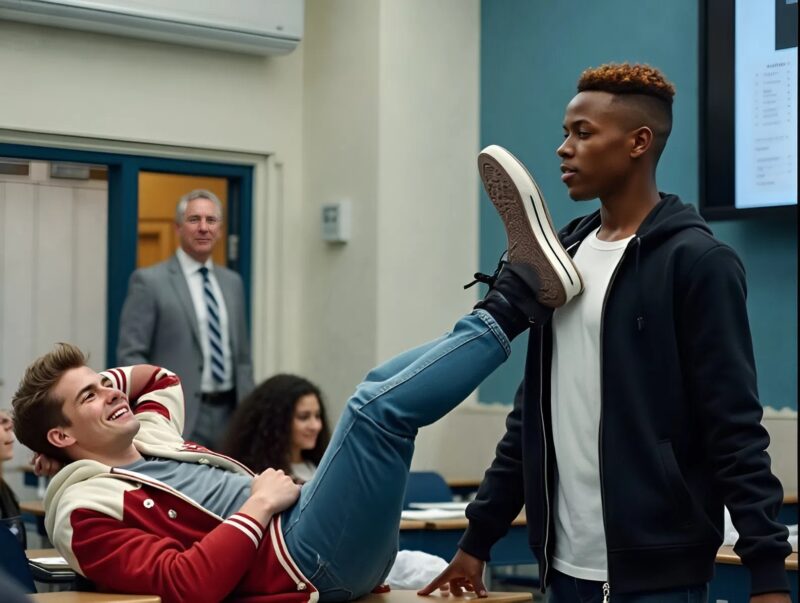
Inside room 10B, that quiet was shattered by Thomas Black’s raised voice. It wasn’t shouting, exactly, but it was sharp, slicing through the air like broken glass. Students who had been chatting fell silent one by one, turning toward the source of the disturbance. Thomas was perched on top of a desk—not his desk, but the desk clearly labeled with the name Kofi Diallo. He sat there like a king who believed the classroom was his kingdom, his posture loud with entitlement.
One of his legs dangled casually over the side, while the other tapped rhythmically against the wooden seat. It wasn’t the carefree tapping of a bored student—it was deliberate, taunting, a challenge. His half-smirk only intensified the arrogance radiating from him. Everyone in class knew that look. Thomas had sparked smaller conflicts before, always pushing boundaries as far as he could.
A couple of boys in the back stifled laughter, nudging each other as if they were watching the opening scene of a spectacle. One even lifted his phone slightly, hoping to record the confrontation without getting caught. The energy in the classroom changed instantly—anticipation, curiosity, tension. The possibility of a clash spread through the room faster than gossip ever could.
Then Kofi Diallo appeared in the doorway.
He stepped inside with slow, measured movements. His hood hung low over his forehead, shadowing part of his face. His hands stayed deep in his pockets, not clenched, not shaking—just steady. His calm presence contrasted sharply with the growing chaos around him. He didn’t rush toward Thomas. He didn’t bark orders. He simply looked at the boy occupying his desk.
And that single look was enough to freeze the air.
Conversations died mid-sentence. Backpacks stopped rustling. Even the boy secretly recording lowered his phone, suddenly aware of the gravity in the room. Kofi’s gaze locked with Thomas’s, and although he wasn’t angry, there was a quiet weight behind his expression—an unspoken warning, a reminder that dignity didn’t need to be loud to be powerful.
His eyes drifted down to the crumpled homework beneath Thomas’s shoe. The paper was smudged with pencil marks and a faint coffee stain from the night before. Everyone knew Kofi turned in flawless work, always neat, always organized. Seeing it treated like trash was an insult that didn’t need to be spoken out loud.
Thomas tapped harder on the desk, smirking. “Are you planning to stand there all day,” he taunted, “or are you finally going to leave and find somewhere else to sit?”
The mockery in his voice hung heavily in the air, thicker than a typical teenage insult. It carried an undercurrent everyone recognized—something deeper, something that made the room even quieter.
Kofi stepped forward, carefully placing his backpack on the floor. The thud echoed off the walls, more powerful than a shout. Even Thomas paused, taken aback by the unexpected boldness of such a simple gesture. The tension tightened, as if the entire classroom was holding its breath.
But Thomas recovered quickly. He leaned forward until he was inches from Kofi’s face. His smirk widened with forced confidence. “Are you deaf?” he muttered. “Or just too slow to get it? This desk is mine now. Permanently.”
The silence felt like it cracked.
When Kofi finally spoke, his voice was calm, controlled, and sharper than any insult Thomas could have thrown. “You might want to think carefully before you start something you won’t be able to finish.”
Gasps spread through the room. Chairs creaked. Someone in the back whispered, “Oh no…” under their breath. For the first time, Thomas’s confidence faltered. His tapping foot paused midair.
And then the classroom door swung open.
The polished footsteps of Principal Richardson replaced the clicking rhythm of Thomas’s shoe. His entrance sent a shockwave through the students. He had a presence that filled any room, commanding respect without raising his voice. His eyes swept across the scene, taking in the overturned papers, the tense standoff, and Thomas perched on a desk that clearly wasn’t his.
His expression hardened. “Thomas,” he said, his voice deep and steady, “do you know whose desk that is?”
Thomas swallowed. Hard.
“This space belongs to Kofi Diallo,” the principal continued, each word echoing through the classroom with the weight of authority. “And you have violated school rules by taking it—and by trying to intimidate another student.”
Laughter from moments earlier was gone. Even breathing sounded too loud.
Richardson stepped closer. “This school will never tolerate disrespect, exclusion, or attempts to embarrass another student. Not now, not ever.”
Thomas’s face paled. His shoulders slumped. Whatever bravado he’d carried into the classroom evaporated instantly.
The principal turned to Kofi. “Are you alright?”
Kofi gave a simple nod. No victory grin, no dramatic reaction—just calm dignity.
“Good,” Richardson said. “Because leadership isn’t about noise or aggression. It’s about knowing your worth and standing firm.”
The class absorbed every word. For the first time, the lesson had nothing to do with textbooks.
Thomas quietly slid off the desk, shrinking into his seat. Kofi took his place again, smoothing the paper Thomas had stepped on. He opened his book and waited for the lesson to begin, as though nothing extraordinary had happened.
Yet everyone knew something had.
That day, the students learned a powerful truth: real strength isn’t loud. Real strength isn’t cruel. Real strength is calm, steady, and rooted in dignity.
And the only person who truly lost was the one who believed he could tear someone else down without consequence.
